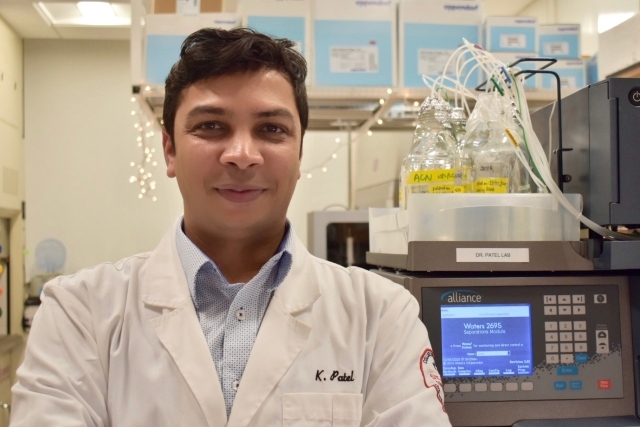
Within the past year, Ketan D. Patel, Ph.D., Associate Professor, Department of Pharmaceutical Sciences, has received two substantial National Institutes of Health (NIH) grants—totaling more than $1.1 million in funding designed to explore next-generation cancer therapy and foster biomedical research at St. John’s University.
The first grant, “Synergistic Combination of Proteolysis Targeting Chimera with a Translational Formulation for the Treatment of Intractable Lung Carcinoma,” is for $492,000, and was provided by the National Cancer Institute of the NIH. The grant is funded under the NIH’s Research Enhancement Award Program R15.
The second grant, “Combination of tumor targeted therapy with stroma modulating agent for PDAC,” is for $656,000 and was provided by the National Institute of General Medical Sciences (NIGMS)Support for Research Excellence (SuRE) Program (R16).
“Lung cancer and pancreatic cancer are amongst the most deadly cancers worldwide,” Dr. Patel stressed. “Both cancers have very different characteristics and tumor hallmarks. It is imperative to identify the key drivers/signature of cancer progression of individual tumors and to develop strategies targeting those niche pathways.”
Dr. Patel’s lab is involved in the development of next-generation, cancer-specific therapy using the novel class of anticancer molecules Proteolysis Targeting Chimera (PROTAC) and advanced drug delivery technologies. A further explanation of PROTAC can be found here.
The focus of Dr. Patel’s work is “bench-to-bedside research” for the study of intractable diseases. “My laboratory is working on developing promising therapeutics for the treatment of drug-resistant cancer using the novel class of anticancer molecules (e.g., protein degraders and PROTAC) and tumor-specific nanotechnology.”
Pancreatic cancer is like a fortress restricting the entry of anticancer nanomedicine, Dr. Patel noted. “The goal of the R16 grant is to remodel the tumor microenvironment for compromising the barriers. It will facilitate deeper penetration of pancreatic tumor targeted nanoparticles.”
“On the other hand, resistance to targeted therapy is one of the biggest challenges in lung cancer treatment,” he continued. “The R15 grant is aimed at simultaneously targeting three key oncogenic drivers of lung cancer progression and resistance. We have identified a very lethal combination of PROTAC next-generation molecules for the treatment of lung cancer with diverse genetic mutations. We anticipate that once a week self-injectable shots will help in the treatment of drug-resistant lung cancer.”
Joining the faculty of St. John’s in 2016, Dr. Patel recalled, “was like a passion turning into a profession.” He has nothing but praise for the College of Pharmacy and Health Sciences faculty, administration, and staff. “We have an exceptional undergraduate program, as well as a renowned graduate research program.”
Dr. Patel’s lab received more than $1.5 million in funding in the last three years for the development of tumor-specific, next-generation therapeutics for drug-resistant, solid tumors including melanoma, lung cancer, and pancreatic cancer. He stressed that he possesses a passion for research, teaching, and mentoring the next generation.
“We support our students’ research and our faculty possess a diverse complementary expertise for drug discovery and clinical development,” Dr. Patel said. “In the last few years, I have received multiple grants from the NIH, foundations, and the corporate world for research on drug-resistant melanoma and pancreatic cancers, which will enhance the program’s recognition and research enthusiasm.”
Dr. Patel noted that his lab also focuses on advanced formulation strategies for opioid abuse deterrents, gene delivery, 3D printing, and HIV prevention.
“Funding is a very vital element of academic research,” he explained. “It allows us to purchase cancer cells for maintenance, testing, and animal study, as well as the chemicals, biological agents, equipment, and other resources required to do our work. Research-grade material is expensive. Substantial funding from organizations like the NIH help us explore novel ideas for the treatment of various diseases and training undergraduate and graduate students in biomedical research.”
Related News
Q&A with School of Education Alumna Linda I. Rosa-Lugo, Ed.D. ’77ED, ’79M.S.Ed.
Linda I. Rosa-Lugo, Ed.D. ’77ED, ’79M.S.Ed., recently accepted a new role as President of the American Speech-Language-Hearing Association (ASHA). Prior to this, Dr. Rosa-Lugo has been an active...
TSOE Alumna Appointed Director of Curriculum in Amityville
Jessica Kemler ’99ED,’22Ed.D.—a double alumna of The School of Education at St. John’s University—began the new year as the new Director of Curriculum in the Amityville, NY, School District. “We are...
Alumna Celebrates Book Launch After Career Change
After developing a passion for helping the younger generation, Ashley Wilson ’14M.S.Ed. pivoted from a career in the music industry to work as an educator. She is also making her mark through her new...
